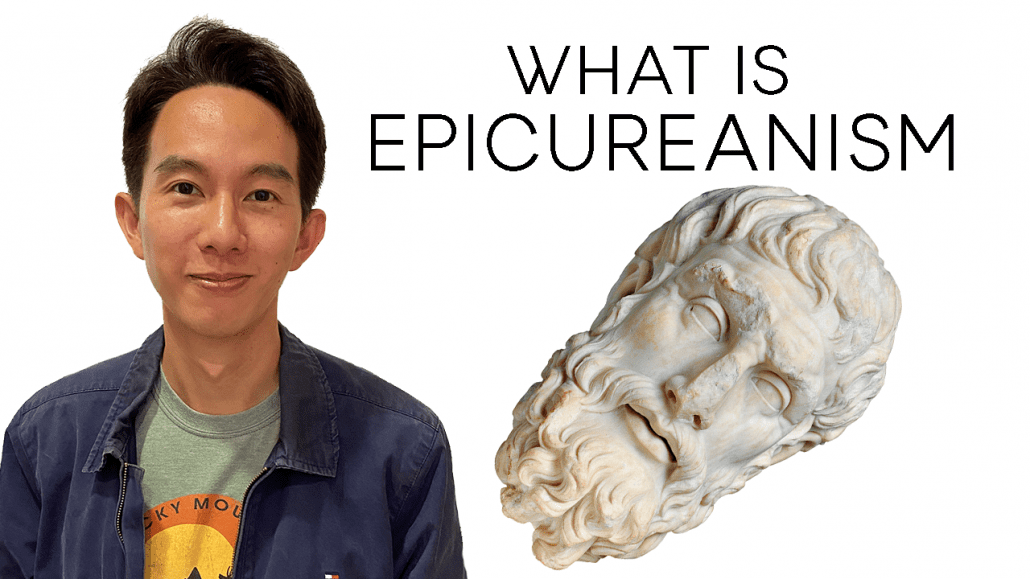What is Epicureanism? (11 Practical Ways to Apply it in Your Life!)
Join our Telegram channel for more market analysis & trading tips: t.me/synapsetrading
Are you tired of constantly chasing after fleeting pleasures and material possessions, only to find yourself feeling unfulfilled and discontent?
Epicureanism, an ancient philosophy founded by the Greek philosopher Epicurus, offers a different approach to finding happiness and fulfillment in life.
This philosophy emphasizes the pursuit of pleasure and avoidance of pain as the ultimate goal of human life, but in a way that is different from what you might expect.
The key is to live a simple and virtuous life, free from fear and physical discomfort, and surrounded by friends.
By understanding the nature of the universe and our place within it, and by learning to control our desires and emotions, we can achieve a state of inner peace and contentment known as “ataraxia.”
In this blog post, I will explore the origins and benefits of this life philosophy, and practical ways you can apply it in your life.
Table of Contents
What is Epicureanism?
Epicureanism is a philosophy that emphasizes the pursuit of pleasure and avoidance of pain as the ultimate goal of human life.
According to Epicureanism, the key to attaining pleasure and avoiding pain is to live a virtuous and simple life, free from fear and physical discomfort, and surrounded by friends.
One of the central teachings of Epicureanism is the concept of “ataraxia,” which refers to a state of inner peace and tranquility that is achieved through the attainment of wisdom and self-control.
Epicureans believed that by understanding the nature of the universe and one’s place within it, and by learning to control one’s desires and emotions, one could achieve a state of inner peace and contentment.
Additionally, Epicureanism teaches that the best way to achieve pleasure and avoid pain is to live a simple and moderate lifestyle, avoiding excess and indulgence in unnecessary pleasures.
Epicureans also believed in the importance of friendship, and that having a community of like-minded individuals with whom one could share one’s life and experiences was essential to achieving a state of happiness and contentment.
Origins of Epicureanism
Epicureanism was founded by the ancient Greek philosopher Epicurus in the 4th century BCE.
Epicurus was born on the island of Samos, but later moved to Athens, where he established his own school of philosophy known as “The Garden.”
Epicurus was heavily influenced by the teachings of the earlier philosopher Democritus, who advocated for an atomistic view of the universe, in which everything was made up of tiny, indestructible particles called atoms.
Epicurus adapted this idea and developed his own atomic theory, which held that the universe was made up of atoms and void, and that all natural phenomena could be explained by the movement and interaction of these atoms.
Epicureanism also drew inspiration from the earlier philosophy of Cyrenaicism, which emphasized the importance of pleasure as the ultimate goal of life.
Epicurus believed that pleasure was the ultimate good and that the avoidance of pain was the ultimate goal.
He emphasized that true pleasure was not to be found in the pursuit of sensual pleasure, but in the attainment of inner peace and tranquility.
Epicureanism quickly gained a following in ancient Greece and Rome, becoming one of the most popular philosophical schools of the time.
Epicurean communities, known as “Gardens,” were established in many cities throughout the Mediterranean world, and the philosophy continued to be studied and debated well into the Roman period and beyond.
Benefits of Epicureanism
Epicureanism can offer many benefits for those who choose to adopt its principles and practices.
Some of these benefits include:
- Emphasis on living a simple and virtuous life: Epicureanism teaches that the key to attaining pleasure and avoiding pain is to live a simple and virtuous life, free from fear and physical discomfort. By focusing on the essentials and avoiding excess and indulgence, one can live a more contented and fulfilling life.
- Attainment of inner peace and tranquility: Through the attainment of wisdom and self-control, Epicureanism encourages the pursuit of “ataraxia” a state of inner peace and tranquility. This state of inner peace is achieved by understanding the nature of the universe, one’s place within it, and by learning to control one’s desires and emotions.
- Importance of friendship: Epicureanism emphasizes the importance of friendship, and that having a community of like-minded individuals with whom one could share one’s life and experiences is essential to achieving a state of happiness and contentment.
- Avoidance of fear and physical pain: Epicureanism emphasizes the avoidance of fear and physical pain as the ultimate goal of human life, by living a simple and virtuous life, one can avoid unnecessary suffering and discomfort, and attain a state of inner peace and contentment.
- Emphasis on rationality: Epicureanism emphasizes the use of reason and logic in understanding the world and our place in it. By using reason and logic, one can understand the nature of the universe, and our place within it, which leads to a state of inner peace and contentment.
- Emphasis on ethics: Epicureanism teaches that to attain pleasure and avoid pain, one must live a virtuous life, this includes ethics, such as kindness and fairness. By living a virtuous life, one can achieve inner peace, and also benefit others around us.
How to Apply Epicureanism in Your Life
To apply Epicureanism in your life, you can try the following practical tips and examples:
- Live a simple and moderate lifestyle: One of the key principles of Epicureanism is to live a simple and moderate lifestyle. This means avoiding excess and indulgence in unnecessary pleasures, and instead focusing on the essentials. One practical way to do this is by setting aside time each day for reflection and mindfulness, and by practicing gratitude for the things that you have in your life.
- Cultivate friendships and community: Epicureanism places a strong emphasis on the importance of friendship and community. To apply this principle in your life, you can make an effort to spend time with friends and loved ones, and to build a supportive community around you. This could involve joining a club or group that interests you, or volunteering in your local community.
- Practice self-control and wisdom: Epicureanism encourages the pursuit of wisdom and self-control as a means to attain inner peace. One practical way to do this is by setting aside time each day for meditation or other mindfulness practices, and by studying and learning about the world and yourself.
- Be mindful of your thoughts and emotions: Epicureanism teaches that by understanding and controlling our thoughts and emotions, we can achieve a state of inner peace. Practical tips to achieve this include journaling and practicing mindfulness, and learning to recognize negative thoughts and emotions and replacing them with positive ones.
- Embrace the virtue and ethics: Epicureanism teaches that to attain pleasure and avoid pain, one must live a virtuous life, this includes ethics, such as kindness and fairness. By embracing the virtue and ethics, you can make a positive impact in your own life and the lives of those around you. Practical ways to do this include volunteering, practicing random acts of kindness, and being mindful of how your actions affect others.
- Cultivate a sense of gratitude: Epicureanism encourages the cultivation of gratitude for what one has in life. Practical ways to do this include keeping a gratitude journal, expressing thanks to loved ones and friends, and taking time to appreciate the beauty of the natural world.
- Prioritize your physical and mental well-being: Epicureanism emphasizes the importance of avoiding fear and physical pain, which means taking care of your physical and mental well-being is essential. Practical ways to do this include engaging in regular physical exercise, eating a healthy diet, getting enough sleep, and seeking professional help if you are struggling with a mental health issue.
- Find balance in your pursuits: Epicureanism encourages the pursuit of pleasure, but also warns against overindulgence. To apply this principle in your life, you can make an effort to find balance in your pursuits and to avoid becoming too attached to any one particular pleasure. This could mean setting limits on how much time you spend on a particular hobby or activity, and making sure to include a variety of different pursuits in your life.
- Learn to be content with what you have: Epicureanism emphasizes the importance of living a simple and moderate lifestyle, which means learning to be content with what you have. Practical ways to do this include setting realistic goals and expectations, and being mindful of the things that bring you happiness and contentment.
- Embrace the idea of living in the present: Epicureanism encourages living in the present moment and not dwelling on the past or worrying about the future. Practical ways to apply this principle in your life include practicing mindfulness, focusing on the task at hand, and learning to appreciate the beauty of the present moment.
- Embrace the concept of “ataraxia” or inner peace: The ultimate goal of Epicureanism is to achieve “ataraxia” or inner peace, this can be achieved by understanding the nature of the universe, one’s place within it, and by learning to control one’s desires and emotions. Practical ways to apply this principle in your life include setting aside time each day for reflection and mindfulness, and studying and learning about the world and yourself.
Famous Examples of Epicureanism
There have been many famous historical figures who have applied Epicureanism in their lives and have shared their practical advice on how to live a happy and fulfilling life.
- Lucretius: Roman poet and philosopher, who was an important figure in the spread of Epicureanism in ancient Rome. He wrote the famous poem “De Rerum Natura” (On the Nature of Things), which expounded the Epicurean philosophy. Lucretius believed that by understanding the nature of the universe, one could achieve a state of inner peace and contentment. He advised people to focus on the present moment, and to avoid worrying about death, which he saw as a natural part of the cycle of life.
- Horace: Roman poet and philosopher, who was a contemporary of Lucretius. He was a proponent of Epicureanism and wrote extensively about the philosophy in his works. Horace believed that the key to happiness was to live a simple and moderate lifestyle, and to avoid excess and indulgence. He advised people to focus on the essentials and to be content with what they have.
- Epictetus: A Greek Stoic philosopher who was a slave before he became a philosopher, he was heavily influenced by the Epicureanism teachings and applied it in his philosophy. He believed that the key to happiness was to learn to control one’s desires and emotions, and to accept the things that one cannot change. He advised people to focus on developing inner strength and self-control, and to avoid becoming attached to material possessions.
- Seneca: Roman philosopher, statesman, and playwright, who was heavily influenced by the Stoicism but also applied Epicureanism in his philosophy. He believed that the key to happiness was to live a virtuous life, free from fear and physical pain. He advised people to focus on the essentials and to avoid excess and indulgence. He also emphasized the importance of self-control and wisdom.
It’s worth noting that some historical figures that were known for following Epicureanism may have not necessarily followed it strictly, but rather applied some of the principles in their lives. They also had their own interpretations, and some of their advice might have been influenced by their time, culture, and personal beliefs.
Concluding Thoughts
Epicureanism is an ancient philosophy that offers a fresh perspective on the pursuit of happiness and fulfillment in life.
Instead of chasing after fleeting pleasures and material possessions, it encourages us to focus on the essentials and to live a simple and virtuous life.
By understanding the nature of the universe, our place within it, and by learning to control our desires and emotions, we can achieve a state of inner peace and contentment.
The importance of friendship is also emphasized in Epicureanism, and having a community of like-minded individuals with whom one could share one’s life and experiences is essential to achieving a state of happiness and contentment.
If you are looking for a different approach to finding meaning and purpose in your life, you might find Epicureanism to be a valuable philosophy to explore.
Now that I have shared what Epicureanism is about, and the practical ways you can apply it in your life, do you think this is a life philosophy which you will want to adopt?
For those already embracing this philosophy, what are some other ways which you have applied Epicureanism in your life?
Let me know in the comments below.

If you are excited to get more life hacks, also check out: “Beyond Financial Freedom: An Unofficial Guide to Living Your Best Life”
 Our flagship mentoring program is suitable for both beginners and advanced traders, covering the 4 strategies which I used over the past 15 years to build up my 7-figure personal trading portfolio.
Our flagship mentoring program is suitable for both beginners and advanced traders, covering the 4 strategies which I used over the past 15 years to build up my 7-figure personal trading portfolio.
 If you're looking for a reputable brokerage that covers all products (SG stocks, US stocks, global stocks, bonds, ETFs, REITs, forex, futures, crypto) and has one of the lowest commissions, this is what I currently use.
If you're looking for a reputable brokerage that covers all products (SG stocks, US stocks, global stocks, bonds, ETFs, REITs, forex, futures, crypto) and has one of the lowest commissions, this is what I currently use.
After trading for 18 years, reading 1500+ books, and mentoring 1000+ traders, I specialise in helping people improve their trading results, by using tested trading strategies, and making better decisions via decision science.






Leave a Reply
Want to join the discussion?Feel free to contribute!